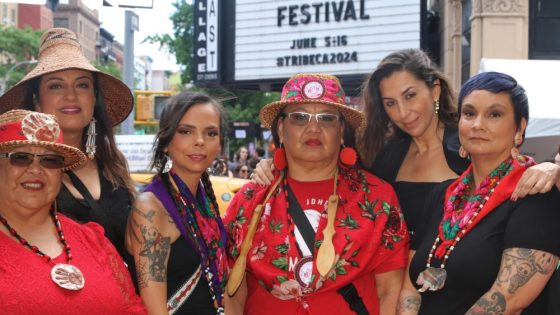Can you recall any true crime stories that examine the disappearance or murder of Indigenous women?
That’s probably because their presence in the media is nearly nonexistent. It’s all the more shocking because, according to the federally funded National Criminal Justice Training Center, the rate of Indigenous women being murdered in the United States is ten times higher than any other ethnicity.
When writer/director Sabrina Van Tassel saw just how underrepresented these victims were in the media and how ignored most were by the justice system, she created the documentary “Missing from Fire Trail Road,” which just had its world premiere at NBC’s Tribeca Festival. “Our goal is to make as much noise as we can,’ she says.
One unique aspect of the film is how it connects the dots between the boarding school scandals of the last century — in which Native American children were taken from their parents, placed in schools, abused and murdered —,to generational trauma, substance abuse and the disappearance of women in their communities today. The 2024 Sundance hit “Sugarcane” focuses on abuse in Canadian boarding schools, but “Missing from Fire Trail Road” reveals similar horrors in their US counterparts.
“Missing from Fire Trail Road” also presents some jaw-dropping facts: until recently, tribal police had no jurisdiction to arrest non-Native Americans, even those who lived on reservations, and investigations are still passed along to different federal authorities with little success.
The LA-based, French-American filmmaker’s journey began ten years ago, when she made a short news segment on missing and murdered Indigenous women. She met activist Deborah Parker, who would become an executive producer of “Missing From Fire Trail Road,”, and the two stayed in touch. “I’ve always had the idea of doing a film about the subject, but I needed a story,” she says. Before she found one, she convinced the indie distributor Film Rise and Canal+ Docs, who acquired her 2020 death row doc “The State of Texas vs. Melissa,” to provide most of the film’s financing.
“One evening this poster popped up on Facebook saying a woman from Tulip had gone missing, offering a large reward to find her. I see she’s missing, and I’m like, ‘Oh my God, I know that tribe.’ Van Tassel wrote a fictional story about a missing woman as a placeholder, then found that it ended up mostly matching the true story of Mary Ellen Johnson-Davis, who disappeared in 2020.
“The fact that Mary Ellen had traveled to know more about her culture and her tribe — and that’s specifically when she disappeared — I thought, ‘Oh my God, that’s almost like a Greek tragedy,” she says. “I feel that every one of my documentaries could be a narrative that I could have written. So the way I direct my documentaries is very much like a narrative — following a story, following [the subjects] until they forget that there’s a camera and are almost being guided.”
The project took about a year to make, and the filmmakers are now looking for a streamer or other TV outlet to distribute it. Van Tassel, who wrote lyrics to two of the film’s songs, is already planning an impact campaign and cross-country tour with the film, hoping it will help save more missing women and change the institutional roadblocks to finding them. It’s a realistic goal: her 2020 doc “The State of Texas vs. Melissa” helped death row convict Melissa Lucio get a stay of execution in the flawed case, and may lead to her exoneration.
“I think that a documentary can change the outcome of someone’s life,” she says. “I saw how proud [the film’s subjects] were to be in Tribeca with their regalia. It felt like a moment in time where all of a sudden I can see that changes are about to happen.”
Source Agencies



